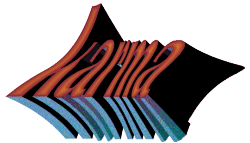
The Karma Home Page
Karma is a toolkit for interprocess communications,
authentication, encryption, graphics display, user interface and
manipulating the Karma network data structure. It contains KarmaLib
(the structured libraries and API) and a large number of modules
(applications) to perform many standard tasks. A suite of
visualisation tools are distributed with the library.
This library is used in the ATNF
Visualisation software (named Sutra, this is now mostly
redundant) which has been developed by Tom Oosterloo
(toosterl@atnf.csiro.au) and myself. These pages
describe all the visualisation tools distributed with Karma.
For a more detailed description of the Karma Library, read the
Karma Library Readme file.
Click here to get current runtime distributions
of Karma. Alternatively, you can check out the Karma ftp
site.
If you have the Karma HTML documentation files installed under
/usr/local/karma/www then click
here to use that
copy: it will be much faster. The
main Karma home page documents the current beta version of Karma,
so there may be a few new things there which your local copy does not
have. The documents you are reading are for Karma version
1.6.26
There is also an update policy document
which describes how things may change from one release or version of
Karma to the next.
Karma Documentation
The Karma documentation is available here.
Screen Snapshots
Screen snapshots of some of the visualisation tools have been taken,
and are available here. To get documentation on these tools please see
the User Manual.
Mailing Lists
Click here to be
put on the mailing for announcements for public releases of
Karma. Public releases contain source code as well as binary
distributions, and usually come out once or twice a year.
Click here to be
put on the mailing for announcements for beta releases of
Karma. Beta releases contain only binary distributions, and usually
come out once or twice a month. Beta releases are intended to provide
early access to new features and bugfixes for the public releases.
References
If you use this software and its use leads to a publication, please
let me know, and include one
of the references below in your publication:
- Gooch, R.E., 1995, "Space and the Spaceball", in Astronomical
Data Analysis Software and Systems IV, ASP Conf. Series vol. 77,
ed. R.A. Shaw, H.E. Payne, & J.J.E. Hayes, ASP, San Francisco,
p.144-147, ISBN 0-937707-96-1
- Gooch, R.E., 1995, "Visualisation: from Data to Understanding", in
Workshop on Applications of Radio Science 1995, Australian
Academy of Science through the National Committee for Radio Science
ISBN 1-86408-030-2
- Gooch, R.E., 1995, "Karma: a Visualisation Test-Bed", in
Astronomical Data Analysis Software and Systems V, ASP
Conf. Series vol. 101, ed. G.H. Jacoby & J. Barnes, ASP, San
Francisco, p.80-83, ISSN 1080-7926
- Gooch, R.E., 1995, "Astronomers and their Shady Algorithms", in
IEEE Visualisation '95, ed. G.M. Nielson \& D. Silver,
pub. IEEE, p.374-377 ISBN 0-8186-7187-4
- Gooch, R.E., 1996, "Grasping the Wispy Tendrils", in
Publications of the Astronomical Society of Australia,
vol. 14, no. 1, p.106 ISSN 1323-3580
Contact: Richard Gooch

